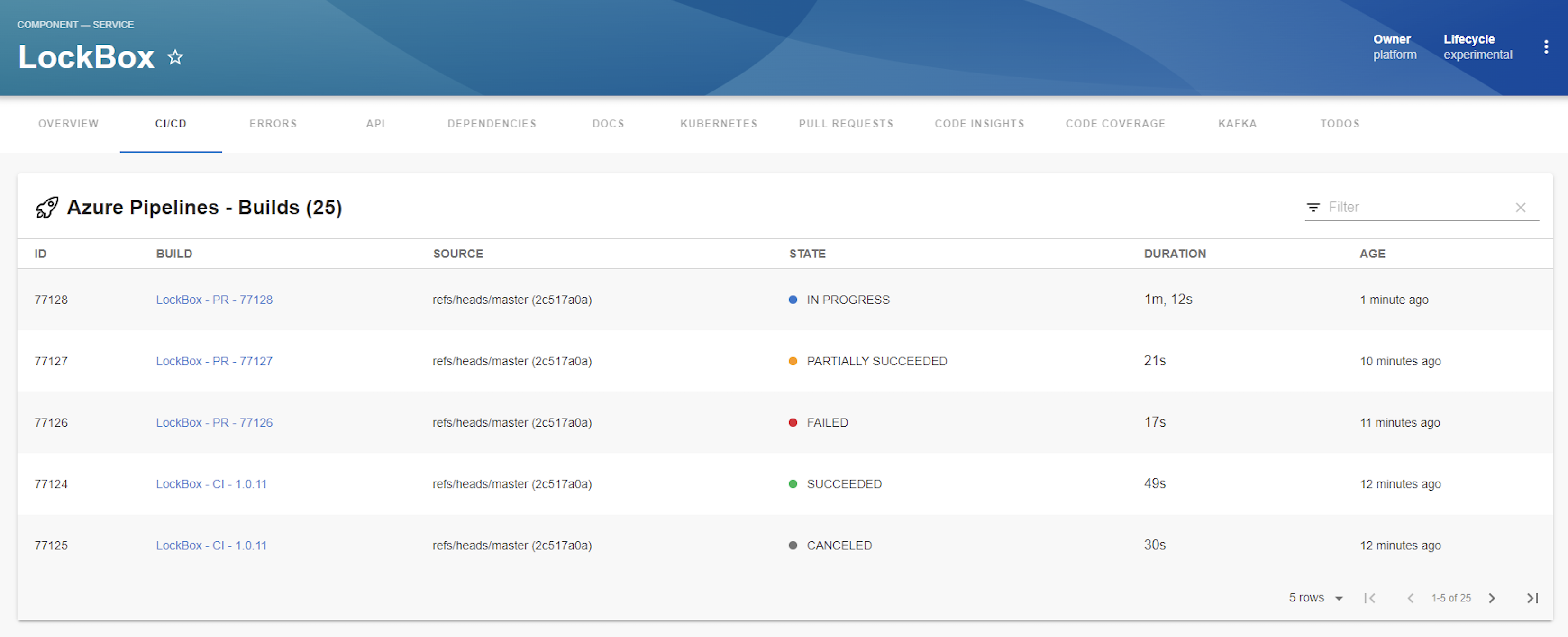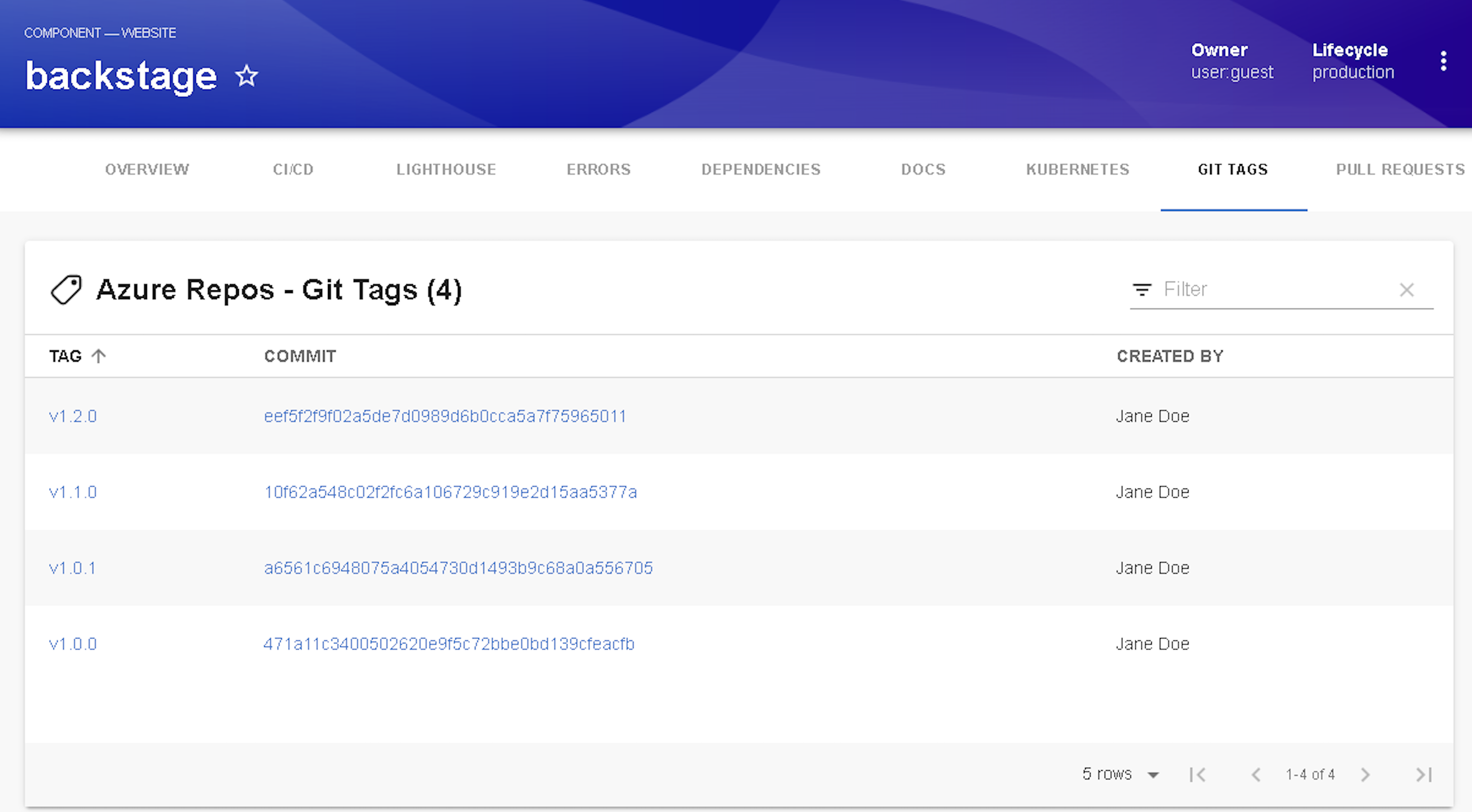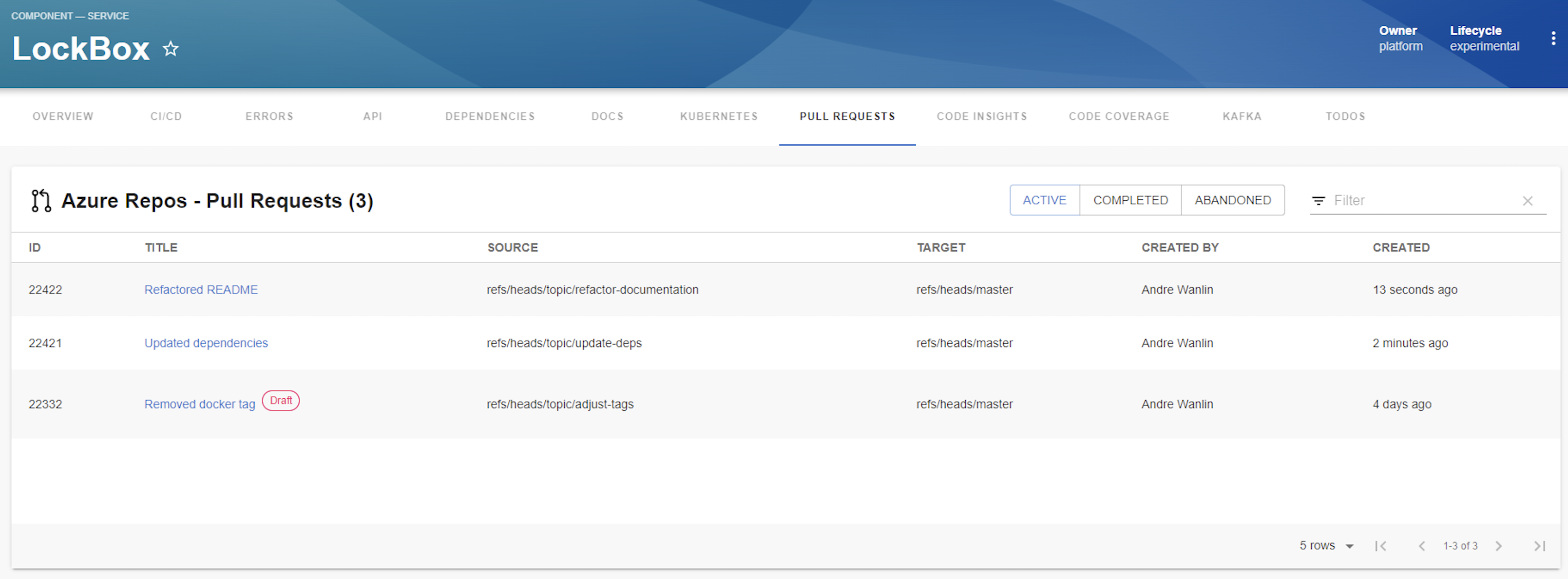Azure DevOps
| Plugin details | |
|---|---|
| Created by | keyloop |
| Category | CI/CD |
| Source | GitHub |
| Type | Open-source plugin |
Prerequisites
Make sure to add the azure integration under git integration section to have an error free experience with this plugin. Follow this doc to know more.
Configuration
Application configuration YAML
This plugin requires a backend proxy configuration to make calls to Azure Pipelines with authentication. The following configuration is set by default, and you need to add the host, token and organization
azureDevOps:
host: dev.azure.com
token: ${AZURE_PERSONAL_ACCESS_TOKEN}
organization: your_organization_name
Secrets
Since the AZURE_PERSONAL_ACCESS_TOKEN variable is used in the application configuration, you must generate a Personal Access Token with read access to both Code and Build and set it as the value of AZURE_PERSONAL_ACCESS_TOKEN.
Delegate proxy
If the host is on a private network, ensure that you include the host URL in this section. If the host is accessible publicly, skip this section.
After adding the host, you can select one or more delegates that have access to the host. If you leave the delegate selectors field empty, it is assumed that all delegates in the account have access to the host/cluster.
When adding the host, include only the host name. Remove the protocol (HTTP/HTTPS) and any port number associated with it.
Layout
No Action Required
This plugin exports an overview page card, UI tab that you can use as a new CI/CD tab for a service or for any other layout page and a Git Tags page. Go to Admin > Layout, select Service in the dropdown menu, and you can view this YAML code in the CI/CD section:
- name: EntityAzurePipelinesContent
path: /azure-pipelines
title: CI/CD
contents:
- component: EntityAzurePipelinesContent
- name: EntityAzurePullRequestsContent
path: /pull-requests
title: Pull Requests
contents:
- component: EntitySwitch
specs:
cases:
- if: isAzureDevOpsAvailable
content:
component: EntityAzurePullRequestsContent
- name: EntityAzureGitTagsContent
path: /git-tags
title: Git Tags
contents:
- component: EntitySwitch
specs:
cases:
- if: isAzureDevOpsAvailable
content:
component: EntityAzureGitTagsContent
The isAzureDevOpsAvailable condition is met when the dev.azure.com/project-repo annotation is present in the software components' catalog-info.yaml definition file.



Annotations
To configure the plugin for a service in the software catalog, set the following annotation in its catalog-info.yaml definition file:
metadata:
annotations:
dev.azure.com/project-repo: <project-name>/<repo-name>
Let's break this down a little: <project-name> will be the name of your Team Project and <repo-name> will be the name of your repository which needs to be part of the Team Project you entered for <project-name>.
Mono repos
If you have multiple entities within a single repo, you will need to specify which pipelines belong to each entity.
dev.azure.com/project-repo: <my-project>/<my-repo>
dev.azure.com/build-definition: <build-definition-name>
Pipeline in different project to repo
If your pipeline is in a different project to the source code, you will need to specify this in the project annotation.
dev.azure.com/project-repo: <project-with-source-code>/<my-repo>
dev.azure.com/build-definition: <build-definition-name>
dev.azure.com/project: <project-with-build-code>
Azure Pipelines Only
If you are only using Azure Pipelines along with a different SCM tool then you can use the following two annotations to see Builds:
dev.azure.com/project: <project-name>
dev.azure.com/build-definition: <build-definition-name>
In this case <project-name> will be the name of your Team Project and <build-definition-name> will be the name of the Build Definition you would like to see Builds for, and it's possible to add more Builds separated by a comma. If the Build Definition name has spaces in it make sure to put quotes around it.
Multiple Organizations
If you have multiple organizations you'll need to also add this annotation:
dev.azure.com/host-org: <host>/<organization>
For this annotation <host> will match the host value in the git integrations of azure which you have set up in git integration section and <organization> will be the name of the Organization that is part of the host.
If the entity we are viewing lives in the my-other-org organization then the dev.azure.com/host-org annotation would look like this:
dev.azure.com/host-org: dev.azure.com/my-other-org
And if the entity was from yet-another-org it would look like this:
dev.azure.com/host-org: server.company.com/yet-another-org
Support
The plugin is owned by keyloop and managed in the Backstage repository as an open-source project. Create a GitHub issue to report bugs or suggest new features for the plugin.